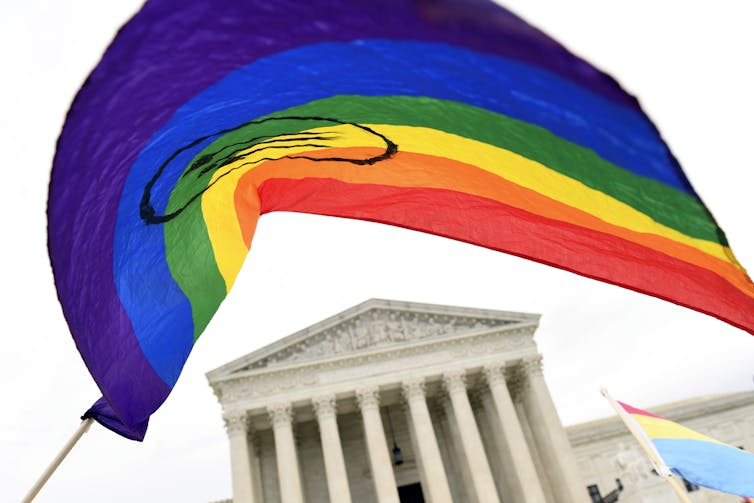The Supreme Court issued a unanimous decision that will transform the role of faith in the workplace in a way that could elevate the rights of religious workers at the expense of their colleagues.
On June 29, 2023, the court ruled unanimously in favor of a Christian postal worker who quit his job and sued the U.S. Postal Service for, in his view, not doing enough to accommodate his request to not work Sundays.
The case, known as Groff v. DeJoy, addressed an employer’s obligation to accommodate religious employees’ requests under federal law.
The upshot is that the ruling means religious employees may have an easier time getting their companies to accommodate requests. But while on the surface it may seem businesses will bear the costs of doing so, as a scholar of employment discrimination I believe other employees may ultimately pay for much of the burden of accommodation.
Religious rights in the workplace
Employers are required to accommodate the religious needs of employees under Title VII of the Civil Rights Act of 1964, so long as they can do so without imposing an “undue hardship.”
Congress didn’t define what that term meant, and it took another dozen years for the Supreme Court to do so in Trans World Airlines v. Hardison. The court determined that Title VII does not require employers to bear more than a “de minimis,” or minimal, cost in accommodating religious employees. The new ruling requires a higher level of accommodation by employers.
Relying on this “de minimis” standard, employees requesting religious accommodation in the workplace have generally fared poorly in the courts. Supporters of more religious accommodation in the workplace have tried many times to amend Title VII to redefine undue hardship as a “significant difficulty or expense.”
From 1994 to 2013, over a dozen bills attempting to codify this definition were introduced in Congress, with none coming close to passage. After failing to persuade Congress to amend Title VII, religious advocates turned to the Supreme Court. The court’s decision to hear this case in the first place was highly unusual because it suggested it was considering overturning its own long-standing precedent.
The other key issue in the case was whether or not a religious accommodation that imposes on co-workers can count as an undue hardship on the employer.
Since Trans World Airlines v. Hardison, most federal appellate courts have determined that accommodations affecting religious employees’ co-workers – such as requiring them to take over undesirable weekend shifts – can be an undue hardship, even if the business is not directly harmed. In practice, that has made it easier for an employer to avoid accommodating a religious request.
Business interests vs. religious rights
Ultimately, the court didn’t overturn the precedent set in TWA v. Hardison.
Instead, it took the equally unusual position of explaining that for almost half a century both the lower courts and Congress misunderstood that decision and that de minimis had never been the appropriate standard. Rather, the court noted that the earlier Supreme Court decision stated three times that accommodation is required unless it results in “substantial” – not minimal – costs.
Relying on this long-ignored language, the new ruling revised “undue hardship” to mean “when a burden is substantial in the overall context of an employer’s business.”
The court’s compromise ruling left unclear what “substantial” means, so I expect more court cases to come as employees push the limits of what can be accommodated.
In addition, the ruling seems to permit employers to sometimes shift this increased accommodation cost to co-workers. While the court provided little guidance on when an accommodation would burden co-workers, this could have the effect of limiting other employees’ rights.
Take, for example, one common type of accommodation request, which is time off from work for religious observance.
In those cases, either co-workers can bear the cost of accommodation, by covering for the religious employee without necessarily earning more income, or the employer can bear the cost of accommodation, by hiring additional workers, paying premium wages or suffering a loss of productivity.
The Supreme Court ruling determined that a cost to co-workers can only count as an undue hardship if those impacts also affect the overall business. That means employers might be able to shift the cost of accommodation onto co-workers – for example, requiring them to work an undesirable weekend shift.

Co-workers bearing the brunt
Co-workers could also be harmed in cases involving accommodation of religious expression. This is of particular concern in cases in which religious expression demeans LGBTQ+ people.
In 2004, the 9th Circuit Court of Appeals determined that it would pose an undue hardship and be demeaning to co-workers for a religious employee to post in his cubicle the Bible verse “If a man also lie with mankind … both of them have committed an abomination; they shall surely be put to death.”
With the new ruling, employers might be required – by a civil rights law originally aimed at prohibiting employment discrimination – to accommodate religious expression that demeans LGBTQ+ employees.
This all suggests religious employees’ co-workers, not companies, could end up bearing the increased cost of accommodation.
At its heart, the case pit business rights versus religious rights. By making it easier to pass the costs onto workers, the ruling allows the Roberts court to maintain its reputation as being both the most pro-business and the most pro-religion court in recent memory.
This is an updated version of an article originally published on May 15, 2023.

